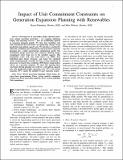Impact of unit commitment constraints on generation expansion planning with renewables
Author(s)
Palmintier, Bryan Stephen; Webster, Mort David
DownloadWebster_Impact of.pdf (382.9Kb)
OPEN_ACCESS_POLICY
Open Access Policy
Creative Commons Attribution-Noncommercial-Share Alike
Terms of use
Metadata
Show full item recordAbstract
Growing use of renewables pushes thermal generators against operating constraints - e.g. ramping, minimum output, and operating reserves - that are traditionally ignored in expansion planning models. We show how including such unit-commitment-derived details can significantly change energy production and optimal capacity mix. We introduce a method for efficiently combining unit commitment and generation expansion planning into a single mixed-integer optimization model. Our formulation groups generators into categories allowing integer commitment states from zero to the installed capacity. This formulation scales well, runs much faster (e.g. 5000×) than individual plant binary decisions, and makes the combined model computationally tractable for large systems (hundreds of generators) at hourly time resolutions (8760 hours) using modern solvers on a personal computer. We show that ignoring these constraints during planning can result in a sub-optimal capacity mix with significantly higher operating costs (17%) and carbon emissions (39%) and/or the inability to meet emissions targets.
Date issued
2011-07Department
Massachusetts Institute of Technology. Engineering Systems DivisionJournal
Proceedings of the 2011 IEEE Power & Energy Society General Meeting
Publisher
Institute of Electrical and Electronics Engineers
Citation
Palmintier, Bryan, and Mort Webster. “Impact of Unit Commitment Constraints on Generation Expansion Planning with Renewables.” IEEE, 2011. 1–7. Web.
Version: Author's final manuscript
Other identifiers
INSPEC Accession Number: 12303039
ISBN
978-1-4577-1001-8
978-1-4577-1000-1
ISSN
1944-9925
1944-9933